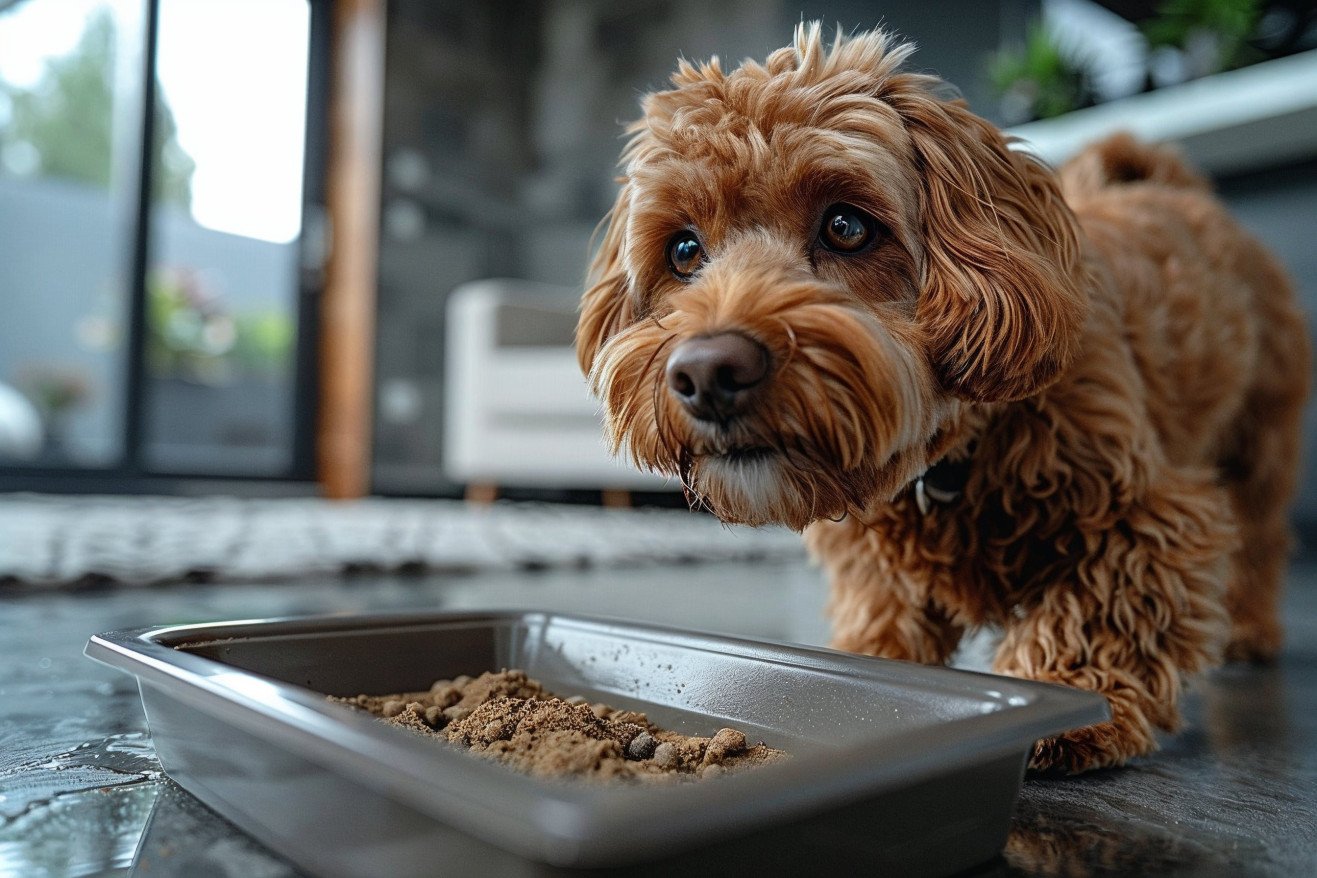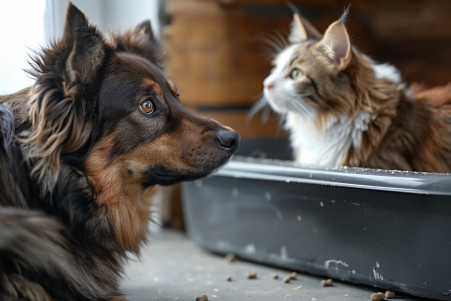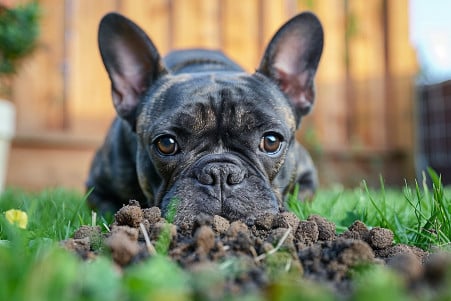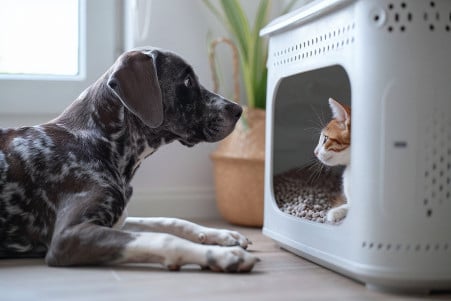Why Does My Dog Eat Cat Poop? Insights on Coprophagy
17 April 2024 • Updated 15 April 2024

If you’ve ever walked in on your dog eating cat poop, you’ve probably asked yourself why they do it. There are a few main reasons why dogs eat cat feces: they're trying to get nutrients that they're not getting from their food, they're following their natural scavenger instincts, or they have a medical condition like malnutrition or intestinal parasites.
We'll look at research from animal behaviorists, veterinarians, and pet nutrition specialists to explain why dogs eat cat poop. By learning about the causes and reasons behind coprophagy, the clinical term for this behavior, you can better understand your dog's nutritional requirements and learn how to stop them from eating cat poop.
Why does my dog eat cat poop?
Toxoplasmosis: A Dangerous Parasite Transmitted Through Cat Feces
Toxoplasmosis is a dangerous parasitic disease caused by the Toxoplasma gondii organism. Although it's more commonly associated with cats, dogs can also get toxoplasmosis by eating the feces of infected cats or soil that's been contaminated with the parasite, according to ASPCA Pet Insurance.
Puppies and dogs with compromised immune systems are most at risk of developing severe symptoms, including fever, diarrhea, difficulty breathing, seizures, and paralysis if they become infected, reports wagwalking.com. While dogs can transmit the parasite to people, they don't shed Toxoplasma in their feces, according to ASPCA Pet Insurance.
To prevent toxoplasmosis, PetHelpful suggests keeping dogs away from cat litter boxes, avoiding raw or undercooked meat, and thoroughly washing fruits and vegetables. If your dog has eaten cat feces and is vomiting or showing signs of neurological problems, get them to the vet right away. They may be diagnosed with blood tests and treated with antiparasitic drugs, such as pyrimethamine and clindamycin, and supportive care, according to DogTime.
Although toxoplasmosis can be very dangerous, knowing the causes, symptoms, and how to prevent it can help keep your dog safe from this parasite that's transmitted through cat feces. That said, eating cat poop can also expose dogs to other dangerous pathogens.
Other Health Risks: Parasites, Bacteria, and Digestive Issues
In addition to toxoplasmosis, eating cat poop can lead to other parasites like giardia and a variety of worms, according to Preventive Vet. Eating cat litter can also lead to digestive problems in dogs, including loss of appetite, abdominal discomfort, vomiting, diarrhea, and halitosis, according to Dutch.
Symptoms that a dog has eaten cat poop include drooling, weakness, weight loss, and evidence of cat litter in their mouth or feces, according to wagwalking.com. If a dog experiences any symptoms after eating cat poop, it’s important for pet parents to contact their vet right away so the dog can be properly evaluated and treated.
Dogs that eat cat feces should be regularly dewormed and treated with parasite prevention medications, according to Preventive Vet. However, with an awareness of the different health risks and some preventive measures, pet parents can help ensure their dogs stay safe from the risks of eating cat poop.
How to Prevent Dogs From Eating Cat Poop
It's important to limit the dog's access to the cat's litter box, says Zigzag. This can be accomplished with physical barriers, litter boxes that are elevated or have a cover, or by keeping the two animals' living areas separate. In addition, keeping the cat's litter box clean and free of feces will help reduce the dog's temptation to eat the cat's poop.
Teaching the dog commands like 'leave it' and using positive reinforcement can help the dog overcome the habit of eating cat poop, according to wikiHow. Making sure the dog is eating a nutritionally complete diet and is getting enough exercise and mental stimulation can help prevent the behavior by addressing issues like hunger and boredom, says the American Kennel Club.
Placing deterrents like stool repellents, pepper, or hot sauce in the cat's litter box can make the poop less appealing to the dog, says A1 Savannahs. By combining these strategies and taking a comprehensive approach, pet owners can successfully prevent their dogs from eating cat poop.
Environmental Modifications and Litter Box Management
One of the most effective ways to prevent a dog from eating cat poop is to place the cat's litter box in an elevated or enclosed area that the dog can't reach, according to the Animal Behavior College. In addition, using covered or dog-proof litter boxes can also help limit the dog's ability to get to the cat's feces, says PetSafe.
Keeping the litter box clean and using litters that reduce odors can make the litter box less appealing to dogs, according to PetSafe. Meanwhile, automatic self-cleaning litter boxes can help keep the area clean and reduce the likelihood that dogs will eat cat poop, according to Dogster.
Meanwhile, pet owners can also use positive reinforcement to train their dogs to avoid eating cat poop by monitoring their time outside and praising them when they don't eat feces, says PetSafe. By combining these environmental modifications and litter box management techniques, pet owners can effectively keep their dogs from getting to and eating cat feces.
Wrapping Up: Unveiling the Mystery of Coprophagy in Dogs
While it's a common problem, dogs eating cat poop can lead to a number of health issues, including parasites, bacteria, and digestive problems. It's important to understand the underlying causes of this behavior, which can be both medical and behavioral, in order to address and prevent it.
A combination of environmental management, training, dietary changes, and deterrents may be needed to successfully stop dogs from eating cat poop. Regular vet visits and preventive care are important for dogs that have a history of eating cat feces. With time and dedication, dog owners can help keep their pets healthy and maintain a happy multi-pet home.


